
Parenting, Therapy Tips 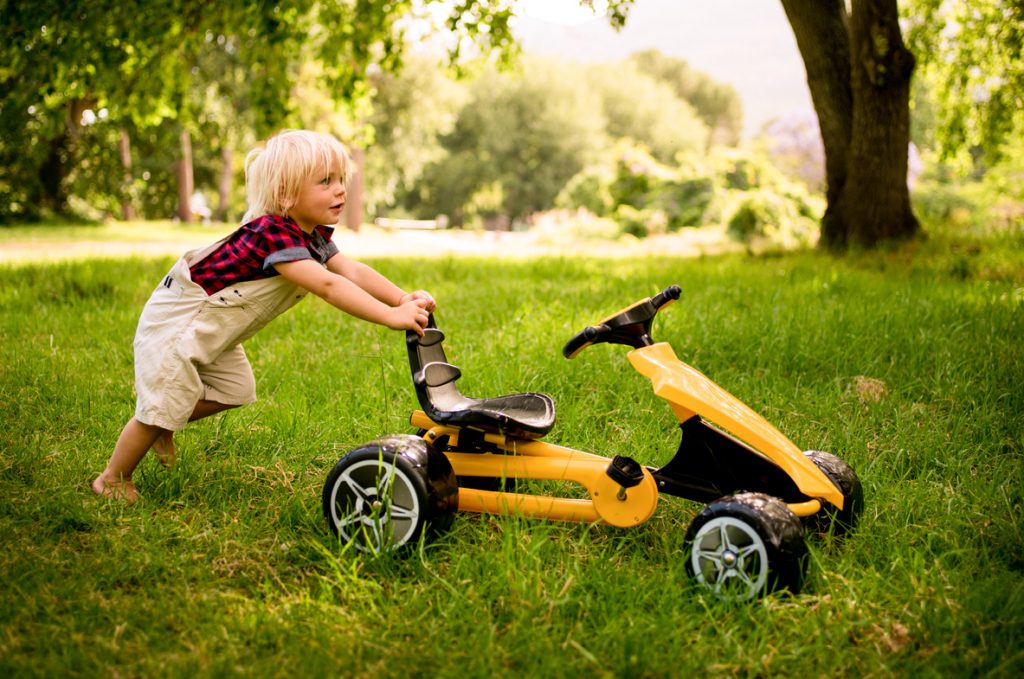 Written by: Meghan Corridan
Intro: "Spring is here, and as the weather gets nicer, kids who’ve been cooped up inside can finally get out of the house. Make the most of that playtime with outdoor toys that are not only fun but also reinforce skills your child may be working on in occupational or physical therapy." Read more
Quick Tip: "Easily one of my favorite outdoor activities is the simple act of drawing with chalk. This timeless activity can keep kids entertained for hours and encourages creativity, drawing, and handwriting. Additionally, this big body activity can help improve upper body strength."
Written by: Meghan Corridan
Intro: "Spring is here, and as the weather gets nicer, kids who’ve been cooped up inside can finally get out of the house. Make the most of that playtime with outdoor toys that are not only fun but also reinforce skills your child may be working on in occupational or physical therapy." Read more
Quick Tip: "Easily one of my favorite outdoor activities is the simple act of drawing with chalk. This timeless activity can keep kids entertained for hours and encourages creativity, drawing, and handwriting. Additionally, this big body activity can help improve upper body strength."
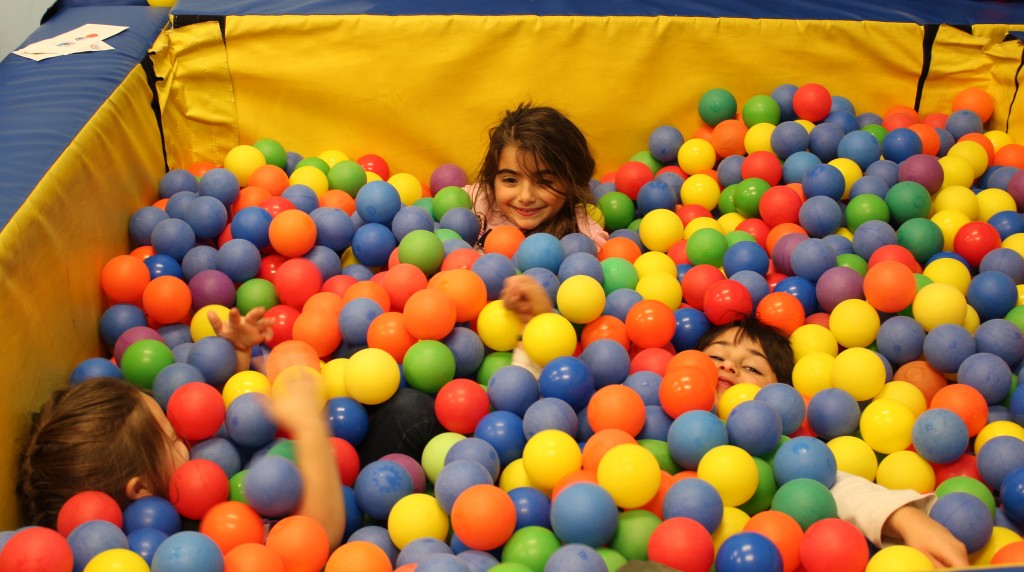 Written by: Rebecca Dean
Intro: "The joys of parenting hold true no matter what your child’s abilities are. But when your child has a sensory processing disorder (SPD), you face a set of challenges most parents do not. Everyday settings often don’t accommodate children with SPD. A child who is over-sensitive might find stimuli like light, physical touch, or food overwhelming. Children who are under-sensitive, on the other hand, might crave so much stimulation it’s hard to meet their needs." Read more
Quick Tip: "You can often use items you already have on hand, so it doesn’t have to be an expensive project. Use a fan for exploring the sensation of air on skin or beanbags for tactile stimulation. Decorate with brightly colored paper or tape, donate old kitchen items for auditory and visual stimuli, or fill bins with sand, gravel, or dry pasta for tactile stimulation."
Written by: Rebecca Dean
Intro: "The joys of parenting hold true no matter what your child’s abilities are. But when your child has a sensory processing disorder (SPD), you face a set of challenges most parents do not. Everyday settings often don’t accommodate children with SPD. A child who is over-sensitive might find stimuli like light, physical touch, or food overwhelming. Children who are under-sensitive, on the other hand, might crave so much stimulation it’s hard to meet their needs." Read more
Quick Tip: "You can often use items you already have on hand, so it doesn’t have to be an expensive project. Use a fan for exploring the sensation of air on skin or beanbags for tactile stimulation. Decorate with brightly colored paper or tape, donate old kitchen items for auditory and visual stimuli, or fill bins with sand, gravel, or dry pasta for tactile stimulation."
 Written by: Jeanette Jones
Intro: "Is your child more active than usual? Is his/her attention or focus hard to maintain? The start of a new school year can be a chaotic and stressful time for both kids and parents. This is especially true for kids with sensory processing challenges, as changes are difficult and can be hard to manage. To support this transitional time and help makes things easier on the family, here are some fun sensory tips and other ideas for back-to-school time." Read more
Quick Tip: "For calming input throughout the school day, pack your child’s backpack with several of your their favorite (heavy) books. This added deep-pressure input can support calming their overall energy level and promote a regulated, more focused state for the day."
Written by: Jeanette Jones
Intro: "Is your child more active than usual? Is his/her attention or focus hard to maintain? The start of a new school year can be a chaotic and stressful time for both kids and parents. This is especially true for kids with sensory processing challenges, as changes are difficult and can be hard to manage. To support this transitional time and help makes things easier on the family, here are some fun sensory tips and other ideas for back-to-school time." Read more
Quick Tip: "For calming input throughout the school day, pack your child’s backpack with several of your their favorite (heavy) books. This added deep-pressure input can support calming their overall energy level and promote a regulated, more focused state for the day."
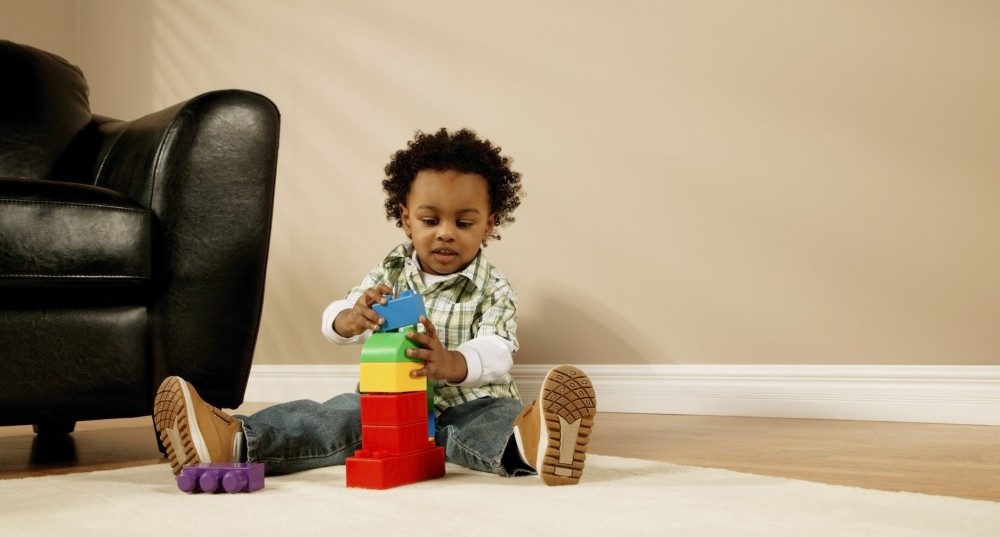 Written by: Rebecca Dean
Intro: "To help children develop the awareness, planning, strength, and coordination they need to complete tasks, it’s important to incorporate activities into their routine to encourage daily practice. The more adults go to the gym, the stronger they get and the faster they see results from their workouts. Similarly, strengthening children’s muscles through practicing skills at home — not just in class or in therapy — will develop results faster." Read more
Quick Tip: "During bath time, put medicine droppers, turkey basters, measuring cups, strainers, plastic tongs, and whatever else you can think of into the tub. Children will have fun learning how these tools work while refining their motor development."
Written by: Rebecca Dean
Intro: "To help children develop the awareness, planning, strength, and coordination they need to complete tasks, it’s important to incorporate activities into their routine to encourage daily practice. The more adults go to the gym, the stronger they get and the faster they see results from their workouts. Similarly, strengthening children’s muscles through practicing skills at home — not just in class or in therapy — will develop results faster." Read more
Quick Tip: "During bath time, put medicine droppers, turkey basters, measuring cups, strainers, plastic tongs, and whatever else you can think of into the tub. Children will have fun learning how these tools work while refining their motor development."
 Written by: Anne Zachry
Intro: "Occupational therapy helps children develop the skills and abilities needed to carry out everyday 'occupations.' A child’s occupations include play, self-care routines, education, and social interaction. If your child receives occupational therapy services, it is important to make the most of the time spent in therapy so that your little one can reach his or her highest potential. Whether therapy takes place in a school or a private setting, here are six things every parent can do to ensure their child gets the most out of every occupational therapy session." Read more
Quick Tip: "Be sure your child wears loose-fitting clothing on the days that he is scheduled for therapy. Wearing a comfy T-shirt, sneakers, and sweatpants will allow him to move freely and get the most out of the therapy activities."
Written by: Anne Zachry
Intro: "Occupational therapy helps children develop the skills and abilities needed to carry out everyday 'occupations.' A child’s occupations include play, self-care routines, education, and social interaction. If your child receives occupational therapy services, it is important to make the most of the time spent in therapy so that your little one can reach his or her highest potential. Whether therapy takes place in a school or a private setting, here are six things every parent can do to ensure their child gets the most out of every occupational therapy session." Read more
Quick Tip: "Be sure your child wears loose-fitting clothing on the days that he is scheduled for therapy. Wearing a comfy T-shirt, sneakers, and sweatpants will allow him to move freely and get the most out of the therapy activities."
 Written by: Jessica Hunt
Intro: "Drooling is an everyday issue for parents of infants and toddlers, especially when their child is teething or has a cold and is congested. But when drooling continues past those early years, it’s time for further investigation and treatment. First, check with your child’s pediatrician to make sure that there is no medical reason why your child is continuing to drool. Barring any medical explanation, drooling may be due to poor awareness in the mouth and/or decreased strength in the lips." Read more
Quick Tip: "Encourage your child to drink out of a straw (without biting on it) or drink out of an open cup" to increase lip and mouth muscle strength.
Written by: Jessica Hunt
Intro: "Drooling is an everyday issue for parents of infants and toddlers, especially when their child is teething or has a cold and is congested. But when drooling continues past those early years, it’s time for further investigation and treatment. First, check with your child’s pediatrician to make sure that there is no medical reason why your child is continuing to drool. Barring any medical explanation, drooling may be due to poor awareness in the mouth and/or decreased strength in the lips." Read more
Quick Tip: "Encourage your child to drink out of a straw (without biting on it) or drink out of an open cup" to increase lip and mouth muscle strength.
 Written by: Jessica Hunt
Intro: "Music surrounds us every day, coming to us from car radios, elevator speakers, the little voices of singing children, and countless other sources. However, music has value beyond entertainment. Because of its effect on gross motor function, breathing, and self-regulation for children who struggle to speak, it has been used as a therapeutic tool for many years." Read more
Quick Tip: "Large-body instruments like drums provide low-bass sounds that help us to organize and time our bodies."
Written by: Jessica Hunt
Intro: "Music surrounds us every day, coming to us from car radios, elevator speakers, the little voices of singing children, and countless other sources. However, music has value beyond entertainment. Because of its effect on gross motor function, breathing, and self-regulation for children who struggle to speak, it has been used as a therapeutic tool for many years." Read more
Quick Tip: "Large-body instruments like drums provide low-bass sounds that help us to organize and time our bodies."
 Written by: The occupational therapy department of The Kaufman Children’s Center for Speech, Language, Sensory-Motor, and Social Connections
Intro: "In occupational therapy, there are many ways to use motivating technology to address specific fine motor, sensory processing and sensory-motor skills. Here is a parent’s guide to apps and game systems that will keep children entertained while also assisting in their development." Read more
Quick Tip: "[Xbox Kinect and Nintendo Wii] systems provide tons of sensory input, allowing for improved body awareness, movement processing, and overall motor skill acquisition and development."
Written by: The occupational therapy department of The Kaufman Children’s Center for Speech, Language, Sensory-Motor, and Social Connections
Intro: "In occupational therapy, there are many ways to use motivating technology to address specific fine motor, sensory processing and sensory-motor skills. Here is a parent’s guide to apps and game systems that will keep children entertained while also assisting in their development." Read more
Quick Tip: "[Xbox Kinect and Nintendo Wii] systems provide tons of sensory input, allowing for improved body awareness, movement processing, and overall motor skill acquisition and development."
 Written by: Jessica Hunt
Intro: "When it comes to play, most parents’ first reaction is to keep it as tidy as possible. With children in the house, we have no choice but to surrender to a certain amount of mess, but the last thing we want to do is clean “gak” out of our carpets. However, allowing a child to have opportunities for messy play is an incredibly important part of development." Read more
Quick Tip: "Have your child be a part of set up and clean up as another sensory experience, while also teaching the importance of the family through chores."
Written by: Jessica Hunt
Intro: "When it comes to play, most parents’ first reaction is to keep it as tidy as possible. With children in the house, we have no choice but to surrender to a certain amount of mess, but the last thing we want to do is clean “gak” out of our carpets. However, allowing a child to have opportunities for messy play is an incredibly important part of development." Read more
Quick Tip: "Have your child be a part of set up and clean up as another sensory experience, while also teaching the importance of the family through chores."
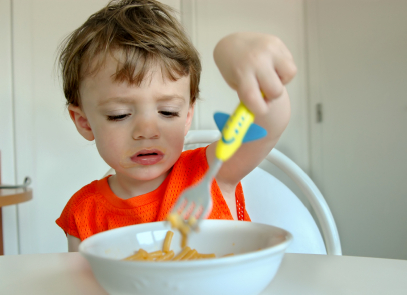 Written by: Chris Purgatori
Intro: "Mealtime for families without special needs kids can be difficult, but for those with kids with sensory processing difficulties it can really be an adventure. While there isn’t an easy way around these challenges, there are a few helpful hints that may keep a child’s feeding issues from turning into significant problems." Read more
Quick Tip: "Positive reinforcement ('If you eat this piece of lettuce, then you’ll be able to play 10 minutes of video games') and extinction/planned ignoring ('Daddy doesn’t hear whining, he only hears big girl words') work the best with behavior-based feeding issues."
Written by: Chris Purgatori
Intro: "Mealtime for families without special needs kids can be difficult, but for those with kids with sensory processing difficulties it can really be an adventure. While there isn’t an easy way around these challenges, there are a few helpful hints that may keep a child’s feeding issues from turning into significant problems." Read more
Quick Tip: "Positive reinforcement ('If you eat this piece of lettuce, then you’ll be able to play 10 minutes of video games') and extinction/planned ignoring ('Daddy doesn’t hear whining, he only hears big girl words') work the best with behavior-based feeding issues."
 Written by: Chris Purgatori
Intro: "For children, transitioning from a desired activity to a new activity can be one of the most difficult tasks of the day. In fact, whether you are at home and it is time for dinner or at the store and it is time to leave without a toy your child wants, transitioning can be difficult for everyone involved. Have you ever been in a crowded mall or restaurant and it’s time to go? Your child begins to show signs of throwing a tantrum and your first thought is, 'Not here, please!' You may be alone, but you don’t have to face it by yourself. Here are some helpful tips, tricks and strategies to help with difficult transitions." Read more
Quick Tip: "Have the child help you create a plan for the day or particular task/activity and write it down step by step. Have the child cross off steps as they are completed."
Written by: Chris Purgatori
Intro: "For children, transitioning from a desired activity to a new activity can be one of the most difficult tasks of the day. In fact, whether you are at home and it is time for dinner or at the store and it is time to leave without a toy your child wants, transitioning can be difficult for everyone involved. Have you ever been in a crowded mall or restaurant and it’s time to go? Your child begins to show signs of throwing a tantrum and your first thought is, 'Not here, please!' You may be alone, but you don’t have to face it by yourself. Here are some helpful tips, tricks and strategies to help with difficult transitions." Read more
Quick Tip: "Have the child help you create a plan for the day or particular task/activity and write it down step by step. Have the child cross off steps as they are completed."
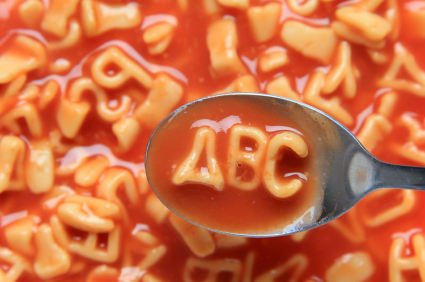 Written by: Magda Girao
Intro: "Though the use of computers and texting is becoming our mode of communication, handwriting continues to be extremely important in our society. Most of us take for granted that our children will begin to write in kindergarten, and many do learn to write letters, numbers and even their names with little trouble. But for some kids, writing is a serious struggle. They try their best, yet fall short when putting pencil to paper. What could be the problem?" Read more
Quick Tip: "Grip strength refers to how much pressure a child exerts to hold onto a pencil and the correct pressure exerted to write. It affects a child’s endurance for writing, cutting and manipulative tasks, as well as the ability to button, zip, snap and tie a shoe."
Written by: Magda Girao
Intro: "Though the use of computers and texting is becoming our mode of communication, handwriting continues to be extremely important in our society. Most of us take for granted that our children will begin to write in kindergarten, and many do learn to write letters, numbers and even their names with little trouble. But for some kids, writing is a serious struggle. They try their best, yet fall short when putting pencil to paper. What could be the problem?" Read more
Quick Tip: "Grip strength refers to how much pressure a child exerts to hold onto a pencil and the correct pressure exerted to write. It affects a child’s endurance for writing, cutting and manipulative tasks, as well as the ability to button, zip, snap and tie a shoe."
12 Posts with Advice for Parents from Occupational Therapists
April is Occupational Therapy Month. If your child sees an occupational therapist at school or privately, you probably know what a resource they are for great advice on getting your child moving and improving in all sorts of developmental ways. On the Friendship Circle blog, we often turn to OTs to write posts with strategies, activities, and explanations for the challenges faced by children with disabilities. Here are a dozen from our archives.1. Ten Fun Outdoor Toys That Strengthen Motor Planning, Executive Function, and Social Skills
 Written by: Meghan Corridan
Intro: "Spring is here, and as the weather gets nicer, kids who’ve been cooped up inside can finally get out of the house. Make the most of that playtime with outdoor toys that are not only fun but also reinforce skills your child may be working on in occupational or physical therapy." Read more
Quick Tip: "Easily one of my favorite outdoor activities is the simple act of drawing with chalk. This timeless activity can keep kids entertained for hours and encourages creativity, drawing, and handwriting. Additionally, this big body activity can help improve upper body strength."
Written by: Meghan Corridan
Intro: "Spring is here, and as the weather gets nicer, kids who’ve been cooped up inside can finally get out of the house. Make the most of that playtime with outdoor toys that are not only fun but also reinforce skills your child may be working on in occupational or physical therapy." Read more
Quick Tip: "Easily one of my favorite outdoor activities is the simple act of drawing with chalk. This timeless activity can keep kids entertained for hours and encourages creativity, drawing, and handwriting. Additionally, this big body activity can help improve upper body strength."
2. Three Benefits of a Sensory Gym for Your Child with Special Needs
 Written by: Rebecca Dean
Intro: "The joys of parenting hold true no matter what your child’s abilities are. But when your child has a sensory processing disorder (SPD), you face a set of challenges most parents do not. Everyday settings often don’t accommodate children with SPD. A child who is over-sensitive might find stimuli like light, physical touch, or food overwhelming. Children who are under-sensitive, on the other hand, might crave so much stimulation it’s hard to meet their needs." Read more
Quick Tip: "You can often use items you already have on hand, so it doesn’t have to be an expensive project. Use a fan for exploring the sensation of air on skin or beanbags for tactile stimulation. Decorate with brightly colored paper or tape, donate old kitchen items for auditory and visual stimuli, or fill bins with sand, gravel, or dry pasta for tactile stimulation."
Written by: Rebecca Dean
Intro: "The joys of parenting hold true no matter what your child’s abilities are. But when your child has a sensory processing disorder (SPD), you face a set of challenges most parents do not. Everyday settings often don’t accommodate children with SPD. A child who is over-sensitive might find stimuli like light, physical touch, or food overwhelming. Children who are under-sensitive, on the other hand, might crave so much stimulation it’s hard to meet their needs." Read more
Quick Tip: "You can often use items you already have on hand, so it doesn’t have to be an expensive project. Use a fan for exploring the sensation of air on skin or beanbags for tactile stimulation. Decorate with brightly colored paper or tape, donate old kitchen items for auditory and visual stimuli, or fill bins with sand, gravel, or dry pasta for tactile stimulation."
3. Five Sensory Tips to Ease the Transition Back To School
 Written by: Jeanette Jones
Intro: "Is your child more active than usual? Is his/her attention or focus hard to maintain? The start of a new school year can be a chaotic and stressful time for both kids and parents. This is especially true for kids with sensory processing challenges, as changes are difficult and can be hard to manage. To support this transitional time and help makes things easier on the family, here are some fun sensory tips and other ideas for back-to-school time." Read more
Quick Tip: "For calming input throughout the school day, pack your child’s backpack with several of your their favorite (heavy) books. This added deep-pressure input can support calming their overall energy level and promote a regulated, more focused state for the day."
Written by: Jeanette Jones
Intro: "Is your child more active than usual? Is his/her attention or focus hard to maintain? The start of a new school year can be a chaotic and stressful time for both kids and parents. This is especially true for kids with sensory processing challenges, as changes are difficult and can be hard to manage. To support this transitional time and help makes things easier on the family, here are some fun sensory tips and other ideas for back-to-school time." Read more
Quick Tip: "For calming input throughout the school day, pack your child’s backpack with several of your their favorite (heavy) books. This added deep-pressure input can support calming their overall energy level and promote a regulated, more focused state for the day."
4. Six Ways For Your Child With Special Needs to Develop Fine Motor Skills at Home
 Written by: Rebecca Dean
Intro: "To help children develop the awareness, planning, strength, and coordination they need to complete tasks, it’s important to incorporate activities into their routine to encourage daily practice. The more adults go to the gym, the stronger they get and the faster they see results from their workouts. Similarly, strengthening children’s muscles through practicing skills at home — not just in class or in therapy — will develop results faster." Read more
Quick Tip: "During bath time, put medicine droppers, turkey basters, measuring cups, strainers, plastic tongs, and whatever else you can think of into the tub. Children will have fun learning how these tools work while refining their motor development."
Written by: Rebecca Dean
Intro: "To help children develop the awareness, planning, strength, and coordination they need to complete tasks, it’s important to incorporate activities into their routine to encourage daily practice. The more adults go to the gym, the stronger they get and the faster they see results from their workouts. Similarly, strengthening children’s muscles through practicing skills at home — not just in class or in therapy — will develop results faster." Read more
Quick Tip: "During bath time, put medicine droppers, turkey basters, measuring cups, strainers, plastic tongs, and whatever else you can think of into the tub. Children will have fun learning how these tools work while refining their motor development."
5. Six Ways Your Child with Special Needs Can Get the Most Out of Occupational Therapy
 Written by: Anne Zachry
Intro: "Occupational therapy helps children develop the skills and abilities needed to carry out everyday 'occupations.' A child’s occupations include play, self-care routines, education, and social interaction. If your child receives occupational therapy services, it is important to make the most of the time spent in therapy so that your little one can reach his or her highest potential. Whether therapy takes place in a school or a private setting, here are six things every parent can do to ensure their child gets the most out of every occupational therapy session." Read more
Quick Tip: "Be sure your child wears loose-fitting clothing on the days that he is scheduled for therapy. Wearing a comfy T-shirt, sneakers, and sweatpants will allow him to move freely and get the most out of the therapy activities."
Written by: Anne Zachry
Intro: "Occupational therapy helps children develop the skills and abilities needed to carry out everyday 'occupations.' A child’s occupations include play, self-care routines, education, and social interaction. If your child receives occupational therapy services, it is important to make the most of the time spent in therapy so that your little one can reach his or her highest potential. Whether therapy takes place in a school or a private setting, here are six things every parent can do to ensure their child gets the most out of every occupational therapy session." Read more
Quick Tip: "Be sure your child wears loose-fitting clothing on the days that he is scheduled for therapy. Wearing a comfy T-shirt, sneakers, and sweatpants will allow him to move freely and get the most out of the therapy activities."
6. Seven Tips to Stop Your Child with Special Needs from Drooling
 Written by: Jessica Hunt
Intro: "Drooling is an everyday issue for parents of infants and toddlers, especially when their child is teething or has a cold and is congested. But when drooling continues past those early years, it’s time for further investigation and treatment. First, check with your child’s pediatrician to make sure that there is no medical reason why your child is continuing to drool. Barring any medical explanation, drooling may be due to poor awareness in the mouth and/or decreased strength in the lips." Read more
Quick Tip: "Encourage your child to drink out of a straw (without biting on it) or drink out of an open cup" to increase lip and mouth muscle strength.
Written by: Jessica Hunt
Intro: "Drooling is an everyday issue for parents of infants and toddlers, especially when their child is teething or has a cold and is congested. But when drooling continues past those early years, it’s time for further investigation and treatment. First, check with your child’s pediatrician to make sure that there is no medical reason why your child is continuing to drool. Barring any medical explanation, drooling may be due to poor awareness in the mouth and/or decreased strength in the lips." Read more
Quick Tip: "Encourage your child to drink out of a straw (without biting on it) or drink out of an open cup" to increase lip and mouth muscle strength.
7. How Music Can Help Children With Special Needs
 Written by: Jessica Hunt
Intro: "Music surrounds us every day, coming to us from car radios, elevator speakers, the little voices of singing children, and countless other sources. However, music has value beyond entertainment. Because of its effect on gross motor function, breathing, and self-regulation for children who struggle to speak, it has been used as a therapeutic tool for many years." Read more
Quick Tip: "Large-body instruments like drums provide low-bass sounds that help us to organize and time our bodies."
Written by: Jessica Hunt
Intro: "Music surrounds us every day, coming to us from car radios, elevator speakers, the little voices of singing children, and countless other sources. However, music has value beyond entertainment. Because of its effect on gross motor function, breathing, and self-regulation for children who struggle to speak, it has been used as a therapeutic tool for many years." Read more
Quick Tip: "Large-body instruments like drums provide low-bass sounds that help us to organize and time our bodies."
8. Twelve iPad, Xbox, and Wii Games That Help With Occupational Therapy
 Written by: The occupational therapy department of The Kaufman Children’s Center for Speech, Language, Sensory-Motor, and Social Connections
Intro: "In occupational therapy, there are many ways to use motivating technology to address specific fine motor, sensory processing and sensory-motor skills. Here is a parent’s guide to apps and game systems that will keep children entertained while also assisting in their development." Read more
Quick Tip: "[Xbox Kinect and Nintendo Wii] systems provide tons of sensory input, allowing for improved body awareness, movement processing, and overall motor skill acquisition and development."
Written by: The occupational therapy department of The Kaufman Children’s Center for Speech, Language, Sensory-Motor, and Social Connections
Intro: "In occupational therapy, there are many ways to use motivating technology to address specific fine motor, sensory processing and sensory-motor skills. Here is a parent’s guide to apps and game systems that will keep children entertained while also assisting in their development." Read more
Quick Tip: "[Xbox Kinect and Nintendo Wii] systems provide tons of sensory input, allowing for improved body awareness, movement processing, and overall motor skill acquisition and development."
9. Why Children With Special Needs Should Get Messy!
 Written by: Jessica Hunt
Intro: "When it comes to play, most parents’ first reaction is to keep it as tidy as possible. With children in the house, we have no choice but to surrender to a certain amount of mess, but the last thing we want to do is clean “gak” out of our carpets. However, allowing a child to have opportunities for messy play is an incredibly important part of development." Read more
Quick Tip: "Have your child be a part of set up and clean up as another sensory experience, while also teaching the importance of the family through chores."
Written by: Jessica Hunt
Intro: "When it comes to play, most parents’ first reaction is to keep it as tidy as possible. With children in the house, we have no choice but to surrender to a certain amount of mess, but the last thing we want to do is clean “gak” out of our carpets. However, allowing a child to have opportunities for messy play is an incredibly important part of development." Read more
Quick Tip: "Have your child be a part of set up and clean up as another sensory experience, while also teaching the importance of the family through chores."
10. Mealtimes: Five Challenges and Solutions for Feeding Your Child with Special Needs
 Written by: Chris Purgatori
Intro: "Mealtime for families without special needs kids can be difficult, but for those with kids with sensory processing difficulties it can really be an adventure. While there isn’t an easy way around these challenges, there are a few helpful hints that may keep a child’s feeding issues from turning into significant problems." Read more
Quick Tip: "Positive reinforcement ('If you eat this piece of lettuce, then you’ll be able to play 10 minutes of video games') and extinction/planned ignoring ('Daddy doesn’t hear whining, he only hears big girl words') work the best with behavior-based feeding issues."
Written by: Chris Purgatori
Intro: "Mealtime for families without special needs kids can be difficult, but for those with kids with sensory processing difficulties it can really be an adventure. While there isn’t an easy way around these challenges, there are a few helpful hints that may keep a child’s feeding issues from turning into significant problems." Read more
Quick Tip: "Positive reinforcement ('If you eat this piece of lettuce, then you’ll be able to play 10 minutes of video games') and extinction/planned ignoring ('Daddy doesn’t hear whining, he only hears big girl words') work the best with behavior-based feeding issues."
11. Twelve Special Needs Transition Tips, Tricks, and Strategies
 Written by: Chris Purgatori
Intro: "For children, transitioning from a desired activity to a new activity can be one of the most difficult tasks of the day. In fact, whether you are at home and it is time for dinner or at the store and it is time to leave without a toy your child wants, transitioning can be difficult for everyone involved. Have you ever been in a crowded mall or restaurant and it’s time to go? Your child begins to show signs of throwing a tantrum and your first thought is, 'Not here, please!' You may be alone, but you don’t have to face it by yourself. Here are some helpful tips, tricks and strategies to help with difficult transitions." Read more
Quick Tip: "Have the child help you create a plan for the day or particular task/activity and write it down step by step. Have the child cross off steps as they are completed."
Written by: Chris Purgatori
Intro: "For children, transitioning from a desired activity to a new activity can be one of the most difficult tasks of the day. In fact, whether you are at home and it is time for dinner or at the store and it is time to leave without a toy your child wants, transitioning can be difficult for everyone involved. Have you ever been in a crowded mall or restaurant and it’s time to go? Your child begins to show signs of throwing a tantrum and your first thought is, 'Not here, please!' You may be alone, but you don’t have to face it by yourself. Here are some helpful tips, tricks and strategies to help with difficult transitions." Read more
Quick Tip: "Have the child help you create a plan for the day or particular task/activity and write it down step by step. Have the child cross off steps as they are completed."
12. The ABCs of Handwriting for Children with Special Needs
 Written by: Magda Girao
Intro: "Though the use of computers and texting is becoming our mode of communication, handwriting continues to be extremely important in our society. Most of us take for granted that our children will begin to write in kindergarten, and many do learn to write letters, numbers and even their names with little trouble. But for some kids, writing is a serious struggle. They try their best, yet fall short when putting pencil to paper. What could be the problem?" Read more
Quick Tip: "Grip strength refers to how much pressure a child exerts to hold onto a pencil and the correct pressure exerted to write. It affects a child’s endurance for writing, cutting and manipulative tasks, as well as the ability to button, zip, snap and tie a shoe."
Written by: Magda Girao
Intro: "Though the use of computers and texting is becoming our mode of communication, handwriting continues to be extremely important in our society. Most of us take for granted that our children will begin to write in kindergarten, and many do learn to write letters, numbers and even their names with little trouble. But for some kids, writing is a serious struggle. They try their best, yet fall short when putting pencil to paper. What could be the problem?" Read more
Quick Tip: "Grip strength refers to how much pressure a child exerts to hold onto a pencil and the correct pressure exerted to write. It affects a child’s endurance for writing, cutting and manipulative tasks, as well as the ability to button, zip, snap and tie a shoe." 

